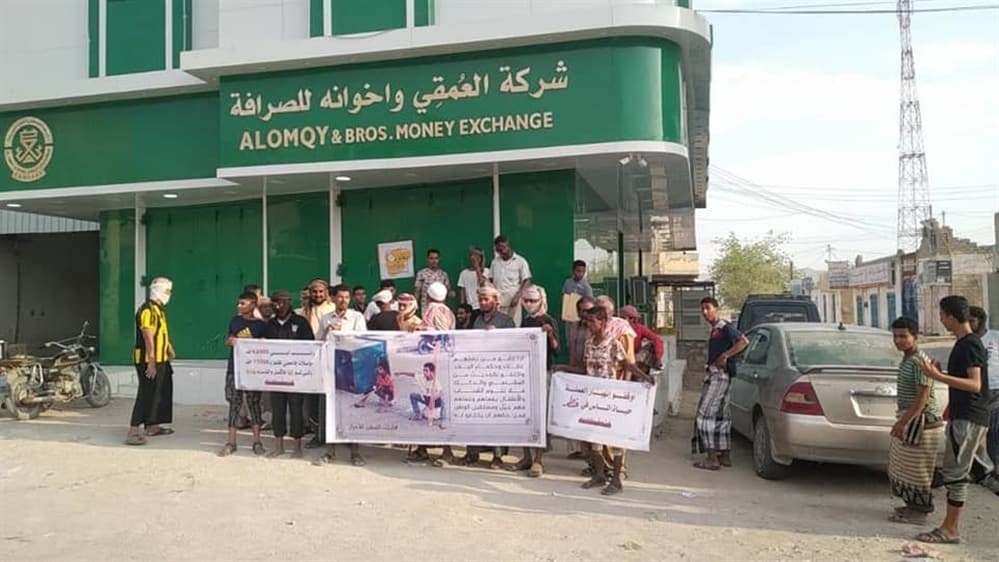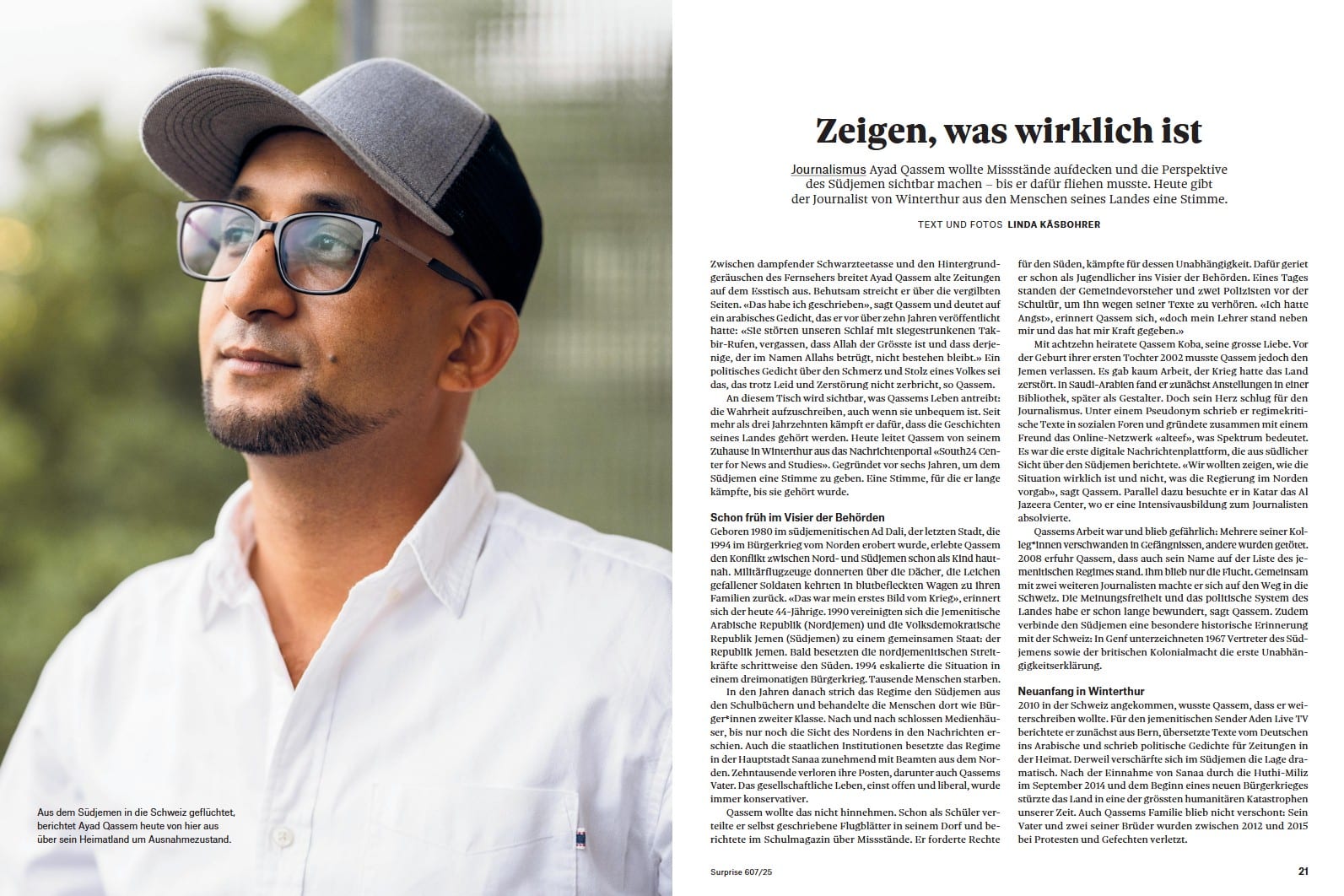
آخر تحديث في: 11-11-2021 الساعة 8 مساءً بتوقيت عدن
Abdullah Al-Shadli (South24)
The activities and the number of the currency exchange companies in Hadramout remained limited until the end of 2011 which witnessed the downfall of the former Yemeni regime followed by the collapse of the state institutions as well as the outbreak of the crisis and the conflict in Yemen.
During that period, some influential figures exploited their powers and their closeness to the new governments to open new currency exchange companies across the Southern governorates under fake registration in light of the Currency Exchange Law 1995 which no longer suits the developments in the international economic arena.
The collapse of the Yemeni currency began after 2015, as the formal price of the Saudi Rial climbed from 57 Yemeni Rial to 80, while the US. Dollar increased from 215 to 250 with the outbreak of the Yemeni War, and the AQAP's control of the city of Mukalla in Hadramout.
The idea of making new exchangers join the Hadrami currency market didn't catch the attention of the powerful figures till the end of 2020, five years after the crisis, which witnessed unprecedented spread and the decline of the governmental oversight amid growing talk of the rampant corruption and nepotism inside the financial governmental bodies.
The spread of the currency exchange outlets has totally marginalized the role of banks, making room for launching a series of new currency exchange businesses, including companies which emerged as part of spawned big companies affiliated with local powerful figures, and others who came from Northern areas to fled sanctions and measures imposed by external and international parties against some companies, and to secure their work in the face of possible suspension.
According to banking sources, the value of foreign currencies against the local currency in South Yemen broke news records during 2021, as the Saudi Rial exceeded 383 Yemeni Rial till Nov10th , according to the Central Bank in Aden, and about 400 in the black market, while the dollar leapfrogged the level of the 1461.
Meanwhile, some licensed exchange companies secretly sell and buy the foreign currencies with the black market prices from trusted customers.
For his part, the economic expert in Hadramout, Dr. Mohammed Saleh Al-Kassadi stresses that the Marib events directly impact the country’s economy, adding that the Houthi threats against Hadramout “pushed many people to convert their money into hard currencies so as to keeping its value, and therefore, the demand increased which accelerated the breakdown and the inflation of the local currency.
Al-Kassadi told “South24” that importing oil and food, as well as the growing demand on the hard currency from all directions, in light of the absence of the Central Bank’s role, led to growing pressure on the currency, and exacerbated the crisis, which caused the spread of currency exchange outlets in a tremendous way which can’t be absorbed by any economy in the world.
Unlicensed companies
Since March 2015, hundreds of currency-exchange offices have been opened illegally across the country, often as extensions of networks which are connected to bigger licensed companies.
While the scale of activities of the unlicensed companies are much smaller than the licensed ones, their attempts to hold their shares in the markets through the bold pricing have badly affected the Rial's exchange rate.
According to an annual report issued by the Yemeni Central Bank in 2014, the number of the operating licensed currency exchange companies in Yemen at that year was 605 while were no unlicensed exchange offices. (1)
Last year, a market study concluded that the number of currency exchange outlets in Yemen increased to more than 1350 by 2017 including about 800 unlicensed offices. (2)
Financial sources at the Yemeni Central Bank in Mukalla confirmed to "South24" that the total number of the licensed currency exchange outlets in Hadramout in the current year is only 36 while others operate without licenses.
Commenting on this number, Al-Kassadi said: "No economy in the world is able to absorb this tremendous number of currency exchange outlets" noting that all companies prior to 2010 were licensed.
He added that "the branching of the big currency exchange companies into subsidiaries in an indirect way by the so-called "spawning" contributes to the collapse of the currency. This policy is adopted by some merchants to evade any legal harassment or threats of closing their outlets. All of these activities are classified as currency speculation.
The economic expert believes that the 1995-Currency Exchange Law is clear and has certain standards "but they currently don’t match the ongoing financial changes, such as money laundering or smuggling operations by the terrorist organizations". He indicated that the law is being applied but it does not suit variables in the international arena.
Illegal financial networks
The internal networks and the companies' agents play a pivotal role in this collapse as they operate unofficially which impacts the supply and demand principle.
Al-Kassadi said that the currency, like any other good, is governed by supply and demand. He noted that the Central Bank previously intervened in cases of huge financial collapse or huge inflation rates but it currently does not have hard currency or a monetary policy to treat the current economic crisis.
The absence of the Yemeni Central Bank's role and its evasion of responsibility led to the economic crisis which made the currency exchange outlets as the alternative to some commercial banks and the Central Bank itself.
The reason behind the spread of such currency exchanges networks, according to Al-Kassadi, is that some of them "are affiliated with officials in both the authority and the state" He noted that the emergence of the current crisis is largely attributed to the corruption of influential figures that run the national economy.
He believes that “the impact of the Yemeni Central Bank is negative and does not serve the interests of the economy, in addition to its failure to monitor the flow of money". He indicated that the currency exchange outlets are not the only factor responsible for the economic collapse but the Houthi economic war caused an unprecedented collapse of the national currency.
Violations and sanctions
On November 7th 2021, the Central Bank announced, through its website, the suspension of 6 currency exchange outlets in the city of Seiyun for violating its system and instructions including Senan, Shiban, Al-Khamisi, Al-Maqboli, Bin Afif and Abd Hud.
Moreover, on November 9th, (3) the Central Bank suspended 10 violating companies in the city of Mukalla, in the wake of an all-out review of all their accounts and activities. The list of companies included Al-Beserih, Al-Omqy, Bindowal, Al-Tarihi, Hadhramaut, Al-Arabia- Wasl- Bin Amin- Hussein Al-Bidani- Al-Bidani Ikhwan.
The total number of the currency exchange outlets, suspended by the Central Bank within the areas controlled by the internationally-recognized government until the first third of November 2021 exceeded 80.
In September 2021, the UAE government added some Yemeni currency exchange companies to the international terrorism list.
This included 38 individuals and 15 entities, such as Al-Inmaa and Al-Omqy in Hadramout, (4)as part of the official UAE's "Supporting Terrorism list”.
Shoveling currency to the Houthi areas
The traders, affiliated with North Yemen, who import their goods from the areas controlled by the Houthi militias, constitute a large percentage in the Southern governorates and the liberated areas. This increases the demand on the hard currency and intensifies the smuggling operation to the Houthi-controlled areas which results in feeding their foreign currency markets and the stability of the local currency there.
The internationally-unrecognized Houthi government insists on using hard currency in dealing with the traders. This step makes the purchasing process akin to importing from abroad and aims at attracting the maximum amount of hard currency for their interests.
According to banking sources, the currency speculation network tends to debit the accounts ledgers into other accounts at the currency exchange companies and doesn’t transfer them directly to the Houthi areas. The official bodies prepare to put an end to such actions after warning the traders of opening accounts in unlicensed exchangers who are subjected to sanctions from the Central Bank.
Economic experts in the areas controlled by the Houthis warn of the “repercussions” regarding the Rial price not only on Sanaa residents and the neighbouring areas but across the other governorates.
They believe that the monopoly of “foreign currencies into the hands of certain people” would “make the state or the ruling authorities unable to provide sufficient foreign currency to import basic materials from abroad”. (5)
The decline of external remittances
The external remittances, especially from the Gulf, have played a pivotal role in supporting the economy and feeding the market by hard currency, as well as helping millions of families since the beginning of the conflict 7 years ago. However, there the rate of such remittances have quickly declined because of the Corona pandemic on the one hand, and due to the harassment experienced by workers in some Gulf nations on the other hand, which reduced the currency's regular flow.
The internal and external remittances enhance the currency market in the country and help families to be more adaptable to shocks and crises since the beginning of the conflict, as they secure a decent life for them in spite of the daily changes.
A report published by the «Acaps analysis HUB Yemen» (6) Center in October 2021, said that the remittances and financial deposits coming from the KSA before the covid -19 pandemic represented 62%, followed by the UAW (18%), Qatar (5%), Kuwait (5%), the USA (4%), Israel (2%), Bahrain, the UK and Libya (1%), and the other countries (2%) according to the World Bank’s estimates in 2017.
The separation of the monetary policy
After the separation of the monetary policy in 2019, which clearly emerged in 2020, those “marital” measures left a huge impact on currency, especially after the Houthi decision to prevent the access of the new currency which was printed in 2017-2018.
Al-Kassadi added: “the Houthi authorities launch an economic and military war against us. Most influence and money is controlled by capitalists in the Northern regions”.
He noted that “the monetary policy, practised by the Houthi government, is almost a separated one, which is the reason behind the currency stability within their areas of control”. The little demand led to the currency availability which left a positive impact on life there.
According to the “Purchasing Power Parity Theory” in the regions which suffer from the price inflation, the purchasing operation in such areas is better and less costly than buying from abroad. This is what the Northern traders have done.
The economic expert Al-Kassadi, said that “there is no solution for this problem without separating the policy of the liberated areas from the financial and monetary policies in the areas controlled by the Houthis”.
A report issued by the United Nations Office for the Coordination of Humanitarian Affairs in August 2021 confirmed that the currency in the Yemeni government regions lost more than 36% of its value in just one year, causing the increase and the instability of prices in these areas.
The Southern governorates have witnessed a state of currency instability which led to the emergence of an unprecedented wave of high prices and a sharp increase in the prices of fuels, food and other consumable products.
Economic experts warn of the continuation of the crisis (7) amid the lack of intervening attempts to save the local currency from sharp collapse which would lead to humanitarian and economic catastrophe that could badly affects the lives of the low income earners, and eliminates the middle class which is adjacent to the poverty line, amid the UN warnings that a growing percentage of the populations are on the verge to starvation.
Abdullah Al-Shadli
Journalist and editor at South24 Center for News and Studies
Photo: Protesters shut down a local money exchange store in Seiyun, Hadramout, September 27, 2021 (local media)
References:
2- Sana’a Center for Strategic Studies
5- Almushahid
7- Reuters

قبل 3 أشهر

قبل 3 أشهر